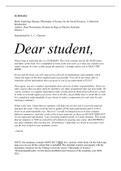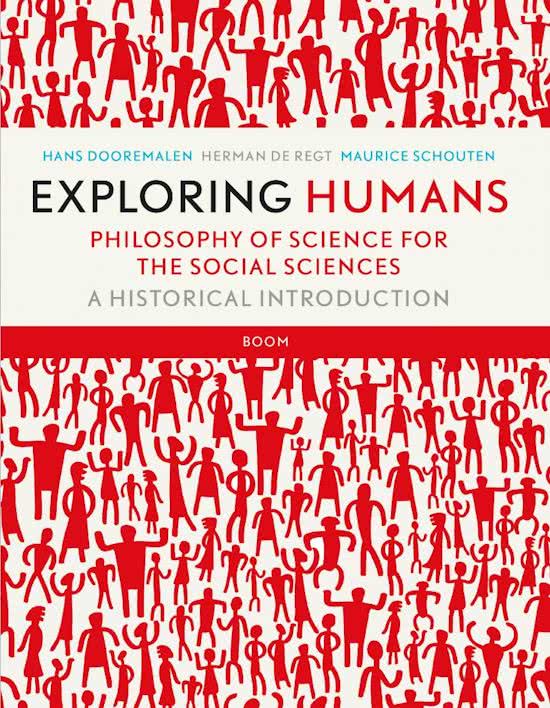SUMMARY
Book: Exploring Humans: Philosophy of Science for the Social Sciences, A Historical
Introduction
Authors: Hans Dooremalen, Herman de Regt en Maurice Schouten
Edition: 1
Summarized by: L. C. Claassen
Dear student,
Please keep in mind that this is a SUMMARY. This work contains merely the MAIN topics
and ideas of the book. It is a simplified version of the real work, so it does not contain every
single concept. In order to fully grasp the material, I strongly advise you to READ THE
BOOK.
If you read the book, you will come across all sorts of explanations and examples which
clarify the topics in the most sophisticated way possible. You will be far better able to
remember all the information that was given to you if you understand it FULLY.
Then again, you are a student, and students have all sorts of other responsibilities. There are
other courses that you must study for and there are other assignments that you must make. Of
course, at times, it is equally important to take a break and not think about school for a while
in order to rest and regain your focus. Next to all this, you probably have a social life as well.
It is completely understandable if you choose to make a compromise for your time by only
studying a summary.
If that is the case, I hope that my summary will help you on your way to learn the material
and pass the exam. I have tried my best to gather all the main information and to write it
down in an understandable way. However, I would recommend you to at least compare
different summaries, and take a look at the lecture material, so that you DO NOT MISS OUT
on any important information. I am a learning student myself, so I make mistakes. This means
that my summary is NOT an end-all be-all solution for passing your exam. And NEITHER is
any other summary that you may use. Nevertheless, I hope that it is of use to you and I wish
you the best of luck in your academic career.
- Lauran
NOTE: this summary contains MOST BUT NOT ALL sections of the book. On the following
page you can see all the content that is included. The included content corresponds with the
mandatory literature for the Tilburg University course ‘Philosophy of Science’ /
‘Wetenschapsfilosofie’ for the Social and Behavioral Sciences of the academic year 2020-
2021.
,INCLUDED SECTIONS
Chapter 1
Chapter 2 (2.1, 2.2, and 2.3)
Chapter 3
Chapter 4 (4.1, page 97-100 second line of text, 4.3.1, 4.3.2, 4.3.3, and 4.3.5)
Chapter 5
Chapter 6 (including ‘Cases – Psychology: Behaviourism’)
Chapter 7 (excluding 7.7, including ‘Cases – Psychology: The Unconscious’)
Chapter 8 (8.1, 8.2, 8.3, 8.4, and ‘Cases – Psychology: Introspectionism’)
Chapter 9 (excluding 9.10, including ‘Cases – Psychology: Representations)
Chapter 10 (including ‘Cases – Psychology: Mental disorders’)
Chapter 11 (11.4.1, 11.4.2, and 11.4.3)
Chapter 12 (12.1, 12.5, 12.6, and 12.7)
,CHAPTER 1: OUT OF THE CAVE: RATIONALISM AND EMPIRICISM IN
ANTIQUITY
1.1 Introduction
- Socrates (470-399 B.C.) was a Greek philosopher. He asked the famous question ‘What is
knowledge?’ This question has influenced many philosophers that came after him to develop
new philosophical views of the world.
- This chapter will look at two historical philosophical views:
1. Rationalism: knowledge is derived from reasoning and thought.
2. Empiricism: knowledge is derived from the senses.
1.2 Plato’s rationalism
- The Greek philosopher Plato (427-347 B.C.) was a student of Socrates. He is seen as the
founder of rationalism.
- Metaphysics: a branch in philosophy that asks ‘Why is there something?’ and ‘What is the
world made of?’ The investigation of metahpysical questions is called ontology.
- Plato supported the metaphysical notion that the world as we experience it is always
changing (e.g. a table appears to be a different shape when you look at it from up close
compared to when you look at it from far away; your perception of the table changes).
Because of this, he argued that you should not derive knowledge from the senses, because
knowledge would then change all the time and be different for different people. Plato said that
true knowledge was about how things really are, not about how they appear to be for you or
me.
- Plato thought that underneath our changing perceptions there is a perfect real world that does
not change. This world would contain eternal and perfect forms of all things, which Plato
called Ideas or Forms. The world that we experience through our senses would just be a
‘shadow’ of the ideal world.
- Plato described his view of the world in his famous allegory of the cave: Imagine prisoners
in a cave who are only able to look at a wall. Now imagine that behind them there is a light,
and people are walking there with statues and figures of animals. The light casts a shadow of
these animals on the wall which the prisoners are able to see. The prisoners have never been
outside of the cave and have only ever seen these projections on the wall for their entire lives.
So, the prisoners think that these shadows are real objects. If a prisoner were to be released
from his position in the cave, he would see the true reality of the world and realize that those
shadows were not real at all.
- Plato argued that our senses work in a similar way as the prisoners in the cave: we can only
perceive ‘shadows’ of the real objective world. If we would base our knowledge on our
senses, we would mistake appearance for reality. Thus, Plato said that empiricism is not the
right way to obtain knowledge, and that we should learn to see past sensory appearances. To
do this, we should use reason.
, - Nativism: the idea that people have innate ideas (knowledge that we possess from birth).
Plato was a proponent of nativism. He believed that we possess all knowledge there is at birth,
but that we cannot remember it. Through reason, we would be able to remember bits and
pieces of knowledge again; when we learn new things, we simply remember knowledge that
was actually already inside us.
1.3 Aristotle’s empiricism
- The Greek philosopher Aristotle (385-322 B.C.) was a student of Plato. He was an
empiricist.
- Aristotle dismissed Plato’s idea of two worlds (the observed natural world and the real
world). He said that the only world is the natural world we inhabit and that all knowledge can
be gained from observing nature.
- Peripatetic Axiom: the notion that something cannot be in the intellect if it was not first
found in the senses.
- As opposed to nativism, empiricists claim that we are born with no knowledge at all; we are
born as a blank slate, a tablet on which nothing is written yet, a so-called tabula rasa.
- Aristotle argued that we only gain knowledge from something if we know its cause. In order
to reach a causal explanation we must use deduction: reason from basic theoretical principles
to specific cases. For example: (1) All human beings are mortal (2) Socrates is a human
being (3) Hence, Socrates is mortal. Such a deductive argument is called a syllogism. Only
when you are certain that the premises are true, you can also say for certain that the
conclusion is true.
- In order to gain knowledge about the primary premises that are used to form the basis of
theoretical principles, Aristotle said that we must use induction: reasoning from concrete
cases to the abstract. Universal principles can be derived from observing particular
phenomena. However, there is a problem with induction: it doesn’t matter how many cases
confirm your premise, you can never be 100% sure that the premise is true (e.g. even if you
have seen a million white swans, you cannot be 100% sure that all swans are white, because
there may always be a swan out there that is not white). No matter how many observations,
you can never guarantee certainty of something. Thus, merely gathering empirical data is not
sufficient for confirming your premises.
- Aristotle argued that induction should be seen as a first step in developing theoretical
principles, and that it should go hand in hand with intuition. By using our intellect, we can
apply a theoretical principle derived from observations to other cases (e.g. by having observed
that some people have died, we can use our intellect to conclude that every person will die).
This intellect is what Aristotle called ‘nous’. Because of this involvement of the nous, some
argue that Aristotle is not a true empiricist because he still uses reason to reach his
conclusions and does not base it on observations alone.
- When Aristotle said that we only gain knowledge from something if we know its cause, he
distinguished four different types of cause (NOTE: these four types are unfortunately not
explained very clearly in the book; only very briefly by using an analogy of creating a statue):
1. Formal cause: the shape of the statue.





